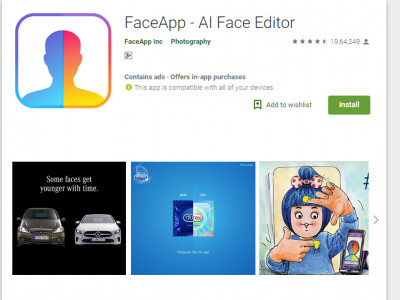Why you really need to read this before having fun with FaceApp
While the world has been going bonkers over FaceApp’s ‘Age’ filter and seeing what they would look like 20-30 years hence, the sane among the netizens are raising some pertinent questions on privacy and security breach.
At the age of 70 how Indian cricketer would look like ?
— Vikas Bal (@ivkyt19) July 16, 2019
An absolutely stunning to see this heart warming image ! #FaceApp pic.twitter.com/rHpoKZ0L8Q
Before downloading the app – incidentally created by a Russian company called Wireless Lab in 2017 – it may do one well to read the fine print (which most people hardly do). As per FaceApp’s privacy policy, the app collects all user content (for example, photos and other materials) that the user posts through the Service. Moreover, FaceApp uses “third-party analytics tools to help us measure traffic and usage trends for the Service. These tools collect information sent by your device or our Service, including the web pages you visit, add-ons, and other information that assists us in improving the Service. We collect and use this analytics information with analytics information from other Users so that it cannot reasonably be used to identify any particular individual User.”
FaceApp also uses device identifiers. The privacy policy states: “When you use a mobile device like a tablet or phone to access our Service, we may access, collect, monitor, store on your device, and/or remotely store one or more “device identifiers.” Device identifiers are small data files or similar data structures stored on or associated with your mobile device, which uniquely identify your mobile device. A device identifier may be data stored in connection with the device hardware, data stored in connection with the device’s operating system or other software, or data sent to the device by FaceApp.”
“A device identifier may deliver information to us or to a third party partner about how you browse and use the Service and may help us or others provide reports or personalized content and ads. Some features of the Service may not function properly if use or availability of device identifiers is impaired or disabled.”
Moreover, FaceApp might also share certain information such as cookie data with third-party advertising partners. This information would allow third-party ad networks to, among other things, deliver targeted advertisements that they believe will be of most interest to the user.
The worrisome part is this, “You grant FaceApp a perpetual, irrevocable, nonexclusive, royalty-free, worldwide, fully-paid, transferable sub-licensable license to use, reproduce, modify, adapt, publish, translate, create derivative works from, distribute, publicly perform and display your User Content and any name, username or likeness provided in connection with your User Content in all media formats and channels now known or later developed, without compensation to you. When you post or otherwise share User Content on or through our Services, you understand that your User Content and any associated information (such as your [username], location or profile photo) will be visible to the public.”
As has been widely reported by now, the FaceApp photo filter uses artificial intelligence and neural network technology that help users to change how they look in their selfies – add a smile, change hairstyles, add a beard or moustache, even change gender, and the most popular of them all – look older or younger.
Me hosting #MasterChef Season 50......#faceapp pic.twitter.com/uKnfxUpC1D
— Gordon Ramsay (@GordonRamsay) July 16, 2019
FaceApp Founder Yaroslav Goncharov has admitted that Google and Amazon handle the AI filtering in the app.
Initially panned by critics as nothing more than a gimmick in the age of digital media applications, FaceApp’s popularity has shot up over the last few days, thanks to celebrities using the Age filter and posting how they would look like in much older versions. In fact, FaceApp became one of the top ranked free apps on Android and Apple on Wednesday (July 17, 2019).
Amid all the madness, respect to Union Minister Smriti Irani for a different take on ‘ageing’. Irani posted a photo of hers from the very popular Balaji Telefilms soap that she had acted in, ‘Kyunki Saas Bhi Kabhi Bahu Thi’, which showed her as an aged lady. Irani wrote, #when@ektaravikapoor gets to you before the #faceappchallenge #tbt.
Expert Speak
Putting the entire hullabaloo over FaceApp into perspective, Sabyasachi Mitter, Founder & MD, Fulcro, commented, “FaceApp has grown in popularity quite rapidly and one must admit the viral potential due to its slick use of AI is commendable.”
Due to hue and cry raised by Western media on whether the app posed a privacy and security risk for users, FaceApp released a statement on TechCrunch stating that, “We might store an uploaded photo in the cloud. The main reason for that is performance and traffic: we want to make sure that the user doesn’t upload the photo repeatedly for every edit operation. Most images are deleted from our servers within 48 hours from the upload date.”
Old age hit me like .. 👀 pic.twitter.com/8yHwIxTlyv
— Arjun Kapoor (@arjunk26) July 16, 2019
The statement also read, “We accept requests from users for removing all their data from our servers. Our support team is currently overloaded, but these requests have our priority.”
However, Fulcro’s Mitter is not convinced by the measures taken by the organisation. He maintained, “While FaceApp may say your data is safe, it is equally true that its terms ensure that once you use the app, you sign a blank cheque to your privacy. While many may argue that users should read the terms carefully before downloading any app, the same is practically infeasible. One can’t expect lay users to sift through and make sense of the legal fine print. While the potential of privacy violation in the case of FaceApp has come to the fore due to its popularity, closer scrutiny would probably bring out thousands of apps with equally dubious terms.”
Does the responsibility lie with the app or Playstore and Apple Store to make the proper checks whether an app’s terms of usage are fair towards users?
“In my opinion, users trust the App Store and Play Store when an app gets listed there for download. Inherently, people believe that enough sanity checks must have been done before the app was approved. The onus, therefore, must fall on the respective stores to read the fine print and warn users if there are clauses in the terms that could potentially infringe on a user’s privacy and then leave it to the user to decide,” felt Mitter.
The government is contemplating whether user’s personal data should be localised within the boundaries of India. As more and more data become available to developers the questions looms above the industry, whether policies such as Europe’s General Data Protection Regulation (GDPR) are warranted.
Mitter concluded by saying, “For users of free apps, the popular saying goes that if the product is free, most likely you are the product. The cost of such free products is recovered by monetising the data generated from users. My advice to users always is that your privacy is like an arrow, it is in your hands as long as you keep it in the quiver, but once it leaves your bow there is nothing in your power to control where and in whose hand it lands up.”










Share
Facebook
YouTube
Tweet
Twitter
LinkedIn